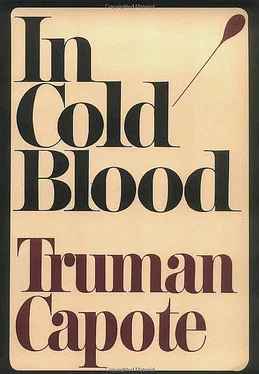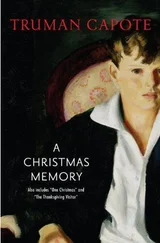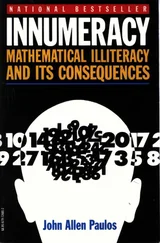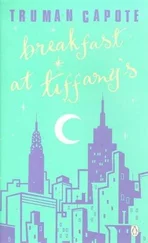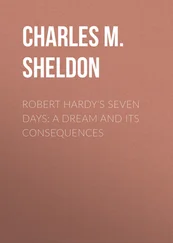Her husband was away on a business trip, and when she was alone, she never thought of having a drink. But tonight she fixed a strong one, then lay down on the living-room couch, a picture album propped against her knees.
A photograph of her father dominated the first page—a studio portrait taken in 1922, the year of his marriage to the young Indian rodeo rider Miss Florence Buckskin. It was a photograph that invariably transfixed Mrs. Johnson. Because of it, she could understand why, when essentially they were so mismatched, her mother had married her father. The young man in the picture exuded virile allure. Everything—the cocky tilt of his ginger-haired head, the squint in his left eye (as though he were sighting a target), the tiny cowboy scarf knotted round his throat—was abundantly attractive. On the whole, Mrs. Johnson’s attitude toward her father was ambivalent, but one aspect of him she had always respected—his fortitude. She well knew how eccentric he seemed to others; he seemed so to her, for that matter. All the same, he was “a real man.” He did things, did them easily. He could make a tree fall precisely where he wished. He could skin a bear, repair a watch, build a house, bake a cake, darn a sock, or catch a trout with a bent pin and a piece of string. Once he had survived a winter alone in the Alaskan wilderness.
Alone: in Mrs. Johnson’s opinion, that was how such men should live. Wives, children, a timid life are not for them. She turned over some pages of childhood snapshots—pictures made in Utah and Nevada and Idaho and Oregon. The rodeo careers of “Tex & Flo” were finished, and the family, living in an old truck, roamed the country hunting work, a hard thing to find in 1933. “Tex John Smith Family picking berries in Oregon,1933” was the caption under a snapshot of four barefooted children wearing overalls and cranky, uniformly fatigued expressions. Berries or stale bread soaked in sweet condensed milk was often all they had to eat. Barbara Johnson remembered that once the family had lived for days on rotten bananas, and that, as a result, Perry had got colic; he had screamed all night, while Bobo, as Barbara was called, wept for fear he was dying.
Bobo was three years older than Perry, and she adored him; he was her only toy, a doll she scrubbed and combed and kissed and sometimes spanked. Here was a picture of the two together bathing naked in a diamond-watered Colorado creek, the brother, a pot-bellied, sun-blackened cupid, clutching his sister’s hand and giggling, as though the tumbling stream contained ghostly tickling fingers. In another snapshot (Mrs. Johnson was unsure, but she thought probably it was taken at a remote Nevada ranch where the family was staying when a final battle between the parents, a terrifying contest in which horsewhips and scalding water and kerosene lamps were used as weapons, had brought the marriage to a stop), she and Perry are astride a pony, their heads are together, their cheeks touch; beyond them dry mountains burn.
Later, when the children and their mother had gone to live in San Francisco, Bobo’s love for the little boy weakened until it went quite away. He wasn’t her baby any more but a wild thing, a thief, a robber. His first recorded arrest was on October 27, 1936—his eighth birthday. Ultimately, after several confinements in institutions and children’s detention centers, he was returned to the custody of his father, and it was many years before Bobo saw him again, except in photographs that Tex John occasionally sent his other children—pictures that, pasted above white-ink captions, were part of the album’s contents. There was “Perry, Dad, and their Husky Dog,” “Perry and Dad Panning for Gold,” “Perry Bear-Hunting in Alaska.” In this last, he was a fur-capped boy of fifteen standing on snowshoes among snow-weighted trees, a rifle hooked under his arm; the face was drawn and the eyes were sad and very tired, and Mrs. Johnson, looking at the picture, was reminded of a “scene” that Perry had made once when he had visited her in Denver. Indeed, it was the last time she had ever seen him—the spring of 1955. They were discussing his childhood with Tex John, and suddenly Perry, who had too much drink inside him, pushed her against a wall and held her there. “I was his nigger,” Perry said. “That’s all. Somebody he could work their guts out and never have to pay them one hot dime. No, Bobo, I’m talking. Shut up, or I’ll throw you in the river. Like once when I was walking across a bridge in Japan, and a guy was standing there, I never saw him before, I just picked him up and threw him in the river.
“Please, Bobo. Please listen. You think I like myself? Oh, the man I could have been! But that bastard never gave me a chance. He wouldn’t let me go to school. O.K. O.K. I was a bad kid. But the time came I begged to go to school. I happen to have a brilliant mind. In case you don’t know. A brilliant mind and talent plus. But no education, because he didn’t want me to learn anything, only how to tote and carry for him. Dumb. That’s the way he wanted me to be. So that I could never escape him. But you, Bobo. You went to school. You and Jimmy and Fern. Every damn one of you got an education. Everybody but me. And I hate you, all of you—Dad and everybody.”
As though for his brother and sisters life had been a bed of roses! Maybe so, if that meant cleaning up Mama’s drunken vomit, if it meant never anything nice to wear or enough to eat. Still, it was true, all three had finished high school. Jimmy, in fact, had graduated at the top of his class—an honor he owed entirely to his own will power. That, Barbara Johnson felt, was what made his suicide so ominous. Strong character, high courage, hard work–it seemed that none of these were determining facto in the fates of Tex John’s children. They shared a doom against which virtue was no defense. Not that Perry was virtuous, or Fern. When Fern was fourteen, she changed her name, and for the rest of her short life she tried to justify the replacement: Joy. She was an easy going girl, “everybody’s sweetheart”—rather too much everybody’s, for she was partial to men, though somehow she hadn’t much luck with them. Somehow, the kind of man she liked always let her down. Her mother had died in an alcoholic coma, and she was afraid of drink—yet she drank. Before she was twenty, Fern-Joy was beginning the day with a bottle of beer. Then, one summer night, she fell from the window of a hotel room. Falling she struck a theater marquee, bounced off it, and rolled under the wheels of a taxi. Above, in the vacated room, police found her shoes, a moneyless purse, an empty whiskey bottle.
One could understand Fern and forgive her, but Jimmy was a different matter. Mrs. Johnson was looking at a picture of him in which he was dressed as a sailor; during the war he had served in the Navy. Slender, a pale young seafarer with an elongated face of slightly dour saintliness, he stood with an arm around the waist of the girl he had married and, in Mrs. Johnson’s estimation, ought not to have, for they had nothing in common—the serious Jimmy and this teen-age San Diego fleet-follower whose glass beads reflected a now long-faded sun. And yet what Jimmy had felt for her was beyond normal love; it was passion—a passion that was in part pathological. As for the girl, she must have loved him, and loved him completely, or she would not have done as she did. If only Jimmy had believed that! Or been capable of believing it. But jealousy imprisoned him. He was mortified by thoughts of the men she had slept with before their marriage; he was convinced, moreover, that she remained promiscuous—that every time he went to sea, or even left her alone for the day, she betrayed him with a multitude of lovers, whose existence he unendingly demanded that she admit. Then she aimed a shotgun at a point between her eyes and pressed the trigger with her toe. When Jimmy found her, he didn’t call the police. He picked her up and put her on the bed and lay down beside her. Sometime around dawn of the next day, he reloaded the gun and killed himself.
Читать дальше
